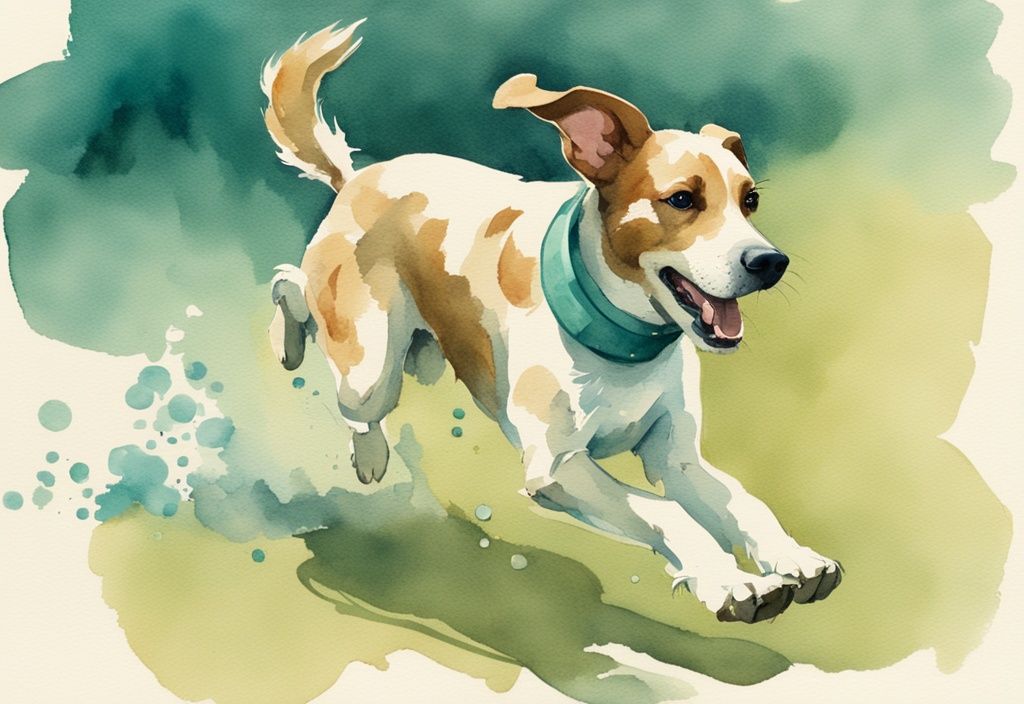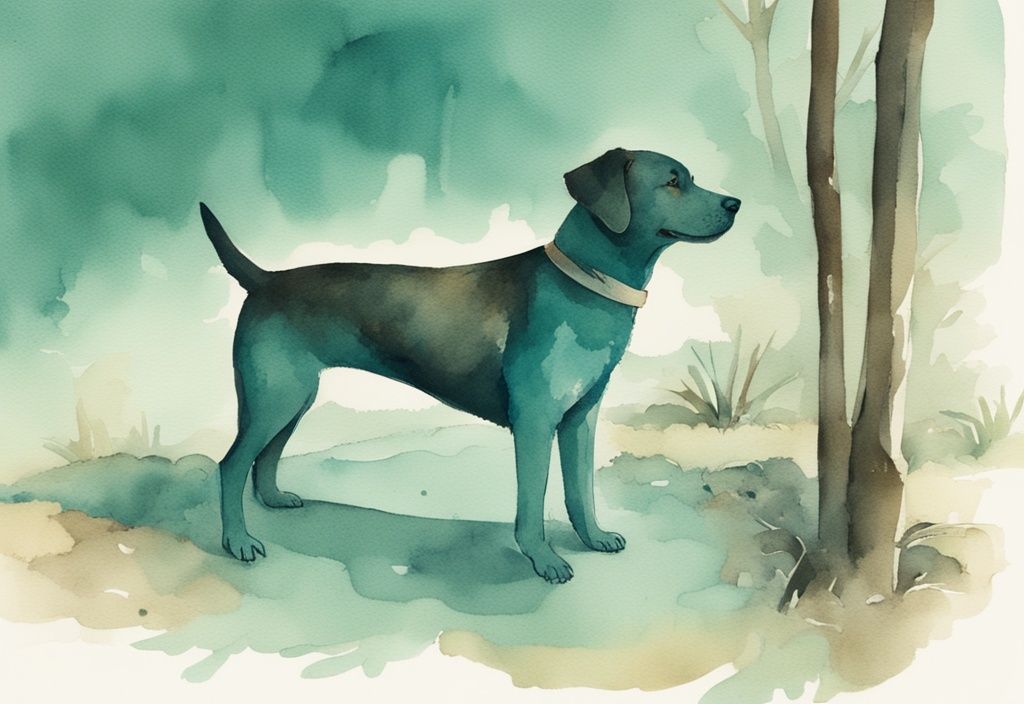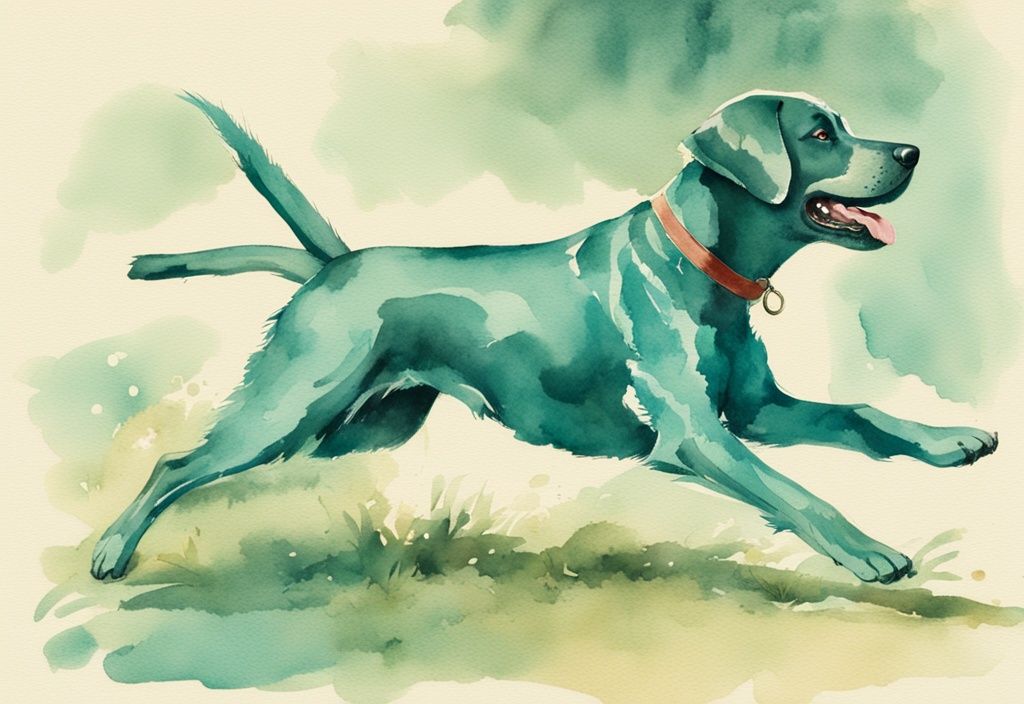Ever looked into your dog’s eyes as they’re dry heaving, yet acting normal otherwise? This situation, although common, can leave you scratching your head in worry. Rest assured, there are explanations and we’re about to discover them.
In this comprehensive article, we’ll explore the world behind your dog’s dry heaves and how their behavior can be unaffected by it. From uncovering potential triggers to highlighting effective remedies, we’ll map out an easy-to-follow guide.
So, if you’ve been wondering “Why is my dog dry heaving but acting normal?” you’ve come to the right place. You can learn more about this condition and equip ourselves with knowledge to provide our four-legged friends with the best care they deserve.
What is Dry Heaving in Dogs and Does it Indicate a Problem?
Definition and Symptoms of Dry Heaving
Dry heaving in dogs happens when they go through the motions of vomiting without actually bringing anything up. You might notice your dog retching, gagging, or even coughing, but with no vomit to show for it. Sometimes also called non-productive retching, it can be pretty nerve-wracking to see.
Though a one-time episode of dry heaving might not be alarming, frequent or recurring episodes could hint at something more serious needing attention from your vet. It’s super important to keep an eye on your pup and consult with a professional if this behavior keeps happening.
Dry Heaving vs. Vomiting
Understanding the difference between dry heaving and vomiting is key. Vomiting usually means your dog is expelling stomach contents like food or bile. Dry heaving, on the other hand, involves all the effort and distress of vomiting but without any result.
A dog is dry heaving but acting normal might simply have an empty stomach. However, don’t let the lack of expelled material fool you—there could still be an underlying issue. Regular dry heaving should definitely prompt a consultation with your vet to ensure nothing serious is going on.
Possible Causes of Your Dog’s Dry Heaving
When your dog is dry heaving but acting normal, it can be a bit puzzling and worrisome. Understanding the potential causes can help you determine the best course of action to ensure your furry friend stays healthy and happy.

Understanding Mechanical Obstructions
Mechanical obstructions are a common cause of dry heaving in dogs even when they seem otherwise fine.
This usually happens when a dog swallows something it shouldn’t, and that foreign object gets stuck in the throat. Immediate veterinary care is crucial to remove the object and prevent any serious complications.
Alternatively, tumors could create partial obstructions in the throat, which also result in dry heaving. These tumors require a thorough medical evaluation and possibly removal. An immediate veterinary assessment ensures that your dog receives the right treatment and monitoring for any accompanying issues. If you’re concerned about treatment options, you might want to know more about whether Cytopoint for dogs is safe for your pet.
Recognizing Gastrointestinal Issues
Gastrointestinal problems can be behind your dog’s dry heaving, even if they seem normal otherwise. Gastric dilation-volvulus, better known as bloat, is an urgent and potentially life-threatening condition. It calls for emergency surgery to prevent severe outcomes.
Other gastrointestinal disorders like pancreatitis or gastritis might be the culprits. These conditions impact the stomach and intestines, leading to significant discomfort and dry heaving. A vet’s intervention is essential to diagnose and treat these issues effectively.
Respiratory Challenges that Can Lead to Dry Heaving
Various respiratory challenges might cause your dog to exhibit dry heaving while still acting normal. Kennel cough, a contagious respiratory illness, often produces a dry, hacking cough that can mimic dry heaving. It’s manageable with medication, but prompt action is necessary to prevent it from worsening.
Upper respiratory infections and diseases like pneumonia can also lead to dry heaving. These conditions affect normal breathing, causing your dog to gag or retch without actually expelling anything. Veterinary diagnosis is vital to identify the specific respiratory challenge and determine the right treatment.
Other Factors Contributing to Dry Heaving
There are many other factors that might lead to your dog dry heaving but acting normal otherwise. For instance, vomiting due to an empty stomach, especially in the early mornings, can cause this symptom.
Fast eating habits can also contribute, as gulping air or not chewing food properly leads to dry heaving. Similarly, ingesting non-food items might trigger the same reaction. Excessive exercise, especially after a full meal, could cause dry heaving too.
Stress and anxiety, heart disease, or cancer might also be underlying reasons for dry heaving. Keeping an eye on your dog’s overall behavior and health, and consulting with a vet about persistent symptoms, ensures their well-being.
Important Signs in a Dog Dry Heaving but Appearing Normal
When your dog is dry heaving but seems otherwise normal, it’s crucial to stay vigilant and aware of any subtle signs that could indicate underlying issues.
Monitoring Appetite and Behavior
When a dog is dry heaving but acting normal, it’s essential to pay close attention to its appetite and behavior. One day, my Golden Retriever, Buddy, skipped his breakfast and felt a bit off despite his usual wagging tail. A sudden loss of appetite can indeed indicate that something is amiss, even if your furry friend appears otherwise healthy.
Remember that dogs are usually pretty lively. So, if you notice your energetic pup turning lethargic, it could be a big red flag. Think about how Snoopy would rather nap than play fetch—odd, right? Increased restlessness or any unusual behavior changes can be subtle signs of discomfort or distress. These may not be immediately obvious but are important to note.
Observing Digestive Irregularities
Digestive irregularities are another critical area to monitor when your dog is dry heaving but acting normal. Buddy once had strange digestive habits that signaled something wasn’t quite right. Look out for abnormal stools, whether it be diarrhea or constipation, as these can point to gastrointestinal issues.
Also, keep an eye on increased salivation—it might indicate nausea or some other internal problem. If your dog shows pain when its belly is touched or you notice an enlarged abdomen, these could be signs of bloat, a serious condition requiring immediate veterinary attention.
 As a dog lover, you know your pet better than anyone. By observing these symptoms closely, you can intervene early and provide your dog with the necessary care to address any potential health concerns. For example, if your dog is experiencing breathing difficulties, you might wonder, how can I give my dog oxygen at home. Trust me, your furry friend will thank you!
As a dog lover, you know your pet better than anyone. By observing these symptoms closely, you can intervene early and provide your dog with the necessary care to address any potential health concerns. For example, if your dog is experiencing breathing difficulties, you might wonder, how can I give my dog oxygen at home. Trust me, your furry friend will thank you!
Expert Tips: Treating Dry Heaving in Dogs
When it comes to addressing dry heaving in dogs, even if your furry friend is acting normal, it’s important to be proactive. Let’s dive into some common treatments and why they could be necessary for your pup’s well-being.
Choosing Suitable Veterinary Treatments
If your dog is dry heaving but acting normal, it still requires careful attention and suitable veterinary treatments to address underlying causes. Getting to the root of the issue can prevent any potential complications.
Kennel Cough and Tonsillitis Treatment
For conditions like kennel cough and tonsillitis, veterinarians often prescribe antibiotics or anti-inflammatory medications. These treatments help to reduce inflammation, combat bacterial infections, and alleviate the symptoms associated with these illnesses. It’s crucial to follow the vet’s prescriptions and not to self-medicate your pet.
Foreign Object Removal
In cases where dry heaving is caused by a foreign object lodged in the throat, a prompt veterinary procedure is necessary. The vet will employ specialized tools to safely remove the obstruction, reducing the risk of damage to the dog’s esophagus or throat. These procedures should be performed as soon as possible to prevent further distress.
Tumor Removal Surgeries
If a tumor is detected as the cause of dry heaving, surgical intervention might be required to remove the mass. The vet will conduct diagnostic tests such as X-rays or ultrasounds to ascertain the tumor’s size and location before proceeding with the surgery. Early detection and removal can significantly improve the dog’s prognosis.
Emergency Surgery for Bloat
Gastric dilation-volvulus, commonly known as bloat, is a serious condition that necessitates emergency surgery. If a dog is dry heaving and exhibits a distended abdomen, immediate veterinary attention is crucial. The surgery involves decompressing the stomach and correcting any volvulus (twisting), which can be life-saving.
Treating Respiratory or Gastrointestinal Conditions
Underlying respiratory conditions like pneumonia or upper respiratory infections, as well as gastrointestinal issues such as pancreatitis or gastritis, can also cause dry heaving. The vet will diagnose the specific condition and prescribe appropriate treatments, which may include antibiotics, anti-nausea medication, or other relevant drugs. Following the vet’s guidance ensures a comprehensive approach to treating the root cause.
If your dog is dry heaving but acting normal, keeping a close eye on their behavior and promptly consulting with a vet will ensure they receive the best care possible. Regularly monitor for any changes and adhere to the prescribed treatments for a swift recovery.
How to Prevent Your Dog from Dry Heaving: Measures and Remedies
Dry heaving in dogs—even when they seem perfectly normal otherwise—can be alarming. This part of the guide dives deep into various measures and remedies to help you keep your furry friend healthy and minimize those unsettling episodes.
Practicing Bloat Prevention Methodologies
Bloat, or gastric dilation-volvulus, is a severe condition that can lead to dry heaving in dogs. To minimize the risk, consider feeding your dog smaller, more frequent meals instead of one or two large ones. This practice helps in avoiding stomach distention that might lead to bloat.

Additionally, slow-feeder bowls are beneficial as they encourage your dog to eat slowly, reducing the likelihood of swallowing excessive air, which can contribute to bloat. For breeds that are at a high risk of bloat, gastropexy—a preventive surgical procedure—can be a viable option to prevent the stomach from twisting.
Preventing Chewing of Inappropriate Objects
Dogs love to explore their world through chewing, which can sometimes lead to dry heaving if they ingest inappropriate objects. To prevent this, always supervise your dog, especially during playtime, to ensure they do not chew on dangerous items. Providing safe and appropriate toys and chews can help distract them from harmful objects. Avoid giving your dog bones, as these can splinter and cause blockages or damage their throat or intestines.
Keeping Kennel Cough at Bay
Kennel cough, a contagious respiratory illness, can lead to dry heaving due to persistent coughing. To reduce the risk of kennel cough, avoid overcrowded kennels and ensure good ventilation in areas where your dog spends most of their time. Regular vaccination against bordetella, the bacterial agent commonly responsible for kennel cough, is also highly recommended as part of your dog’s health care routine.
Benefit of Regular Check-ups
Regular veterinary check-ups are crucial for early detection and treatment of conditions that might lead to dry heaving. These wellness exams allow veterinarians to catch emerging health issues early, whether it’s a throat tumor or another condition. Timely intervention can make a significant difference in preventing the progression of these issues into more severe health problems.
Addressing minor health concerns during these check-ups can effectively prevent them from escalating into something more serious.
Suggested Home Remedies for Mild Dry Heaving
For dogs that are dry heaving but acting normal, certain home remedies can be helpful while you monitor their condition. Offering a bland diet, such as boiled chicken and rice, can soothe the stomach and reduce irritation. Ensuring your dog stays hydrated with plenty of fresh water is also important.
In some cases, a short-term fast can allow the stomach to rest, with food being gradually reintroduced afterward. However, it’s always advisable to consult with a veterinarian before trying any home remedies to ensure they are safe and appropriate for your pet’s specific situation.
Conclusion: Helping Your Dry Heaving Dog Stay Healthy
When dealing with a situation where your dog is dry heaving but acting normal, maintaining constant vigilance is crucial. It’s so easy to miss subtle signs, but sometimes those little things can mean a lot more. By keeping a watchful eye on your dog’s quirky behaviors and health, you can catch potential problems before they set in. Even if your furry friend seems perfectly fine otherwise, recurrent dry heaving episodes shouldn’t be brushed off.
Getting timely veterinary consultation is a huge part of keeping your dog healthy. If your dog shows any dry heaving, even if there aren’t other concerning symptoms, scheduling a vet check-up is a wise move. A professional can conduct necessary examinations to uncover any hidden issues and suggest the right treatment. This way, minor glitches won’t turn into major problems.
Preventive measures are just as important for reducing the risk of dry heaving. For instance, try feeding your dog smaller, more frequent meals or investing in a slow-feeder bowl to help prevent bloat—a potentially serious condition. Regular vet visits, keeping a stress-free environment, and making sure your four-legged pal doesn’t chew on inappropriate items are also good strategies. Vaccinations and routine health screenings play a crucial role in your dog’s overall well-being, too.
Whenever your dog shows signs of dry heaving, seeking professional advice is so vital. Vets have the knowledge and tools to diagnose and treat underlying conditions that might not be immediately obvious. Early intervention can prevent complications and boost the chances of a full recovery. Always better to be cautious and consult with your vet to ensure your pet gets the best care possible.
Frequently Asked Questions
What should I do if my dog is dry heaving but acting normal?
Well, if your fur baby is dry heaving but seems otherwise fine, don’t panic just yet! Keep a close eye on them for any other changes like a lack of interest in food or if they’re unusually tired. Giving them a little break from food and water might help ease any irritation in their throat or tummy. And of course, a quick call to your vet can give you that extra peace of mind—sometimes it’s just better to be safe!
Can stress and anxiety cause dry heaving in dogs?
Absolutely. Just like us, our four-legged friends can get stressed out too. If your dog starts dry heaving out of the blue, think about whether there have been any big changes or stressful events recently. Signs of stress might include things like panting more than usual, pacing around, or acting differently. Creating a calm, comfy environment can make a world of difference. And if needed, there are some fantastic anxiety-reducing products out there that might help.
When should I consult a vet for my dog’s dry heaving?
If the dry heaving is happening often or doesn’t seem to stop, it’s definitely time to get in touch with your vet—especially if you notice other symptoms like lethargy or unusual bowel movements. And if your dog seems to be in serious discomfort, like bloating or drooling excessively, don’t wait. Quick action can prevent bigger issues down the line and keep your pup safe and sound.
